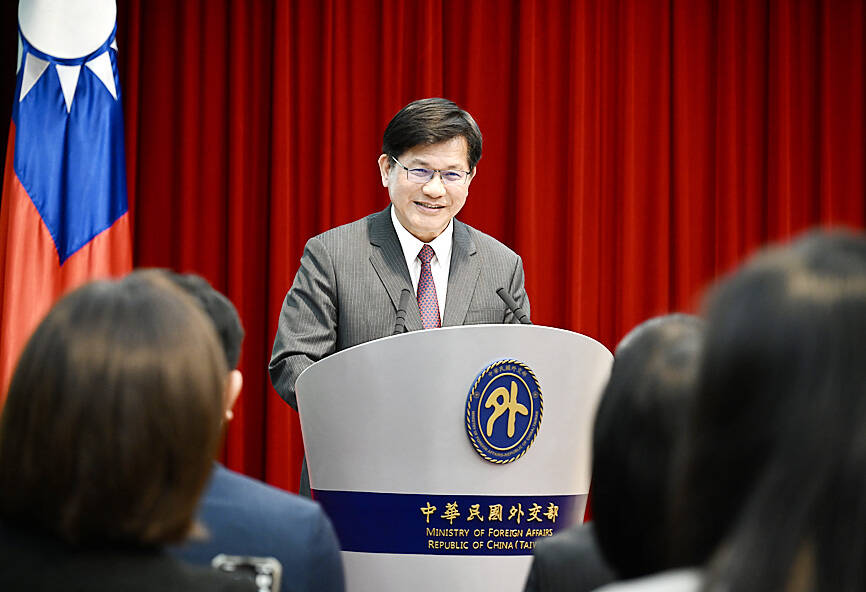US President Donald Trump’s confrontational policy toward China in his second term presents more of an opportunity for Taiwan than a threat, Minister of Foreign Affairs Lin Chia-lung (林佳龍) said.
“The main focus of Trump’s second term is countering China,” Lin said during an interview on an online talk show hosted by a local political pundit that aired on Sunday night.
Although countering China does not necessarily mean supporting Taiwan, the Trump administration’s stance gives Taiwan the opportunity to find common interests with the US, Lin said.

Photo: Lo Pei-de, Taipei Times
“Taiwan’s foreign policy is not formulated on US interests, but is rather based on Taiwan’s interests,” he said.
The government is finding common ground with Washington and focusing on promoting policies where the countries’ interests are aligned, he said.
During his presidential campaign, Trump made controversial remarks about Taiwan, including accusing the nation of “stealing” the chip industry from the US decades ago, Lin said.
Trump also repeatedly expressed frustration that Taipei does not pay the US to fund its defense, he added.
Taiwan needs to take Trump’s words “seriously, but not literally,” Lin said.
In response to Trump’s remarks, President William Lai (賴清德) last month announced that the government aimed to increase defense spending to 3 percent of GDP this year, the minister said.
Lin said he is optimistic about the Trump administration’s foreign policy, as much of the Taiwan-US cooperation during the administration of former US president Joe Biden began during Trump’s first term from 2016 to 2020, and many senior members of Trump’s national security team are Taiwan friendly.
“Trump 2.0 has so far shown more continuity in its policy than variability,” he said, adding that Trump’s second term is offering Taiwan “more opportunities than threats.”
Meanwhile, asked about the US Department of State’s decision to remove from a bilateral relations fact sheet a line indicating Washington’s long-held stance of not supporting Taiwanese independence, and whether that means stronger support from Washington, Lin said he does not believe Taiwan needs to “overinterpret” the move.
Taiwan needs to be more “practical” instead of overreacting to the wording in the fact sheet, he said.
However, it is a good sign showing the need to move away from the Taiwan-US -China trilateral relationship framework established during the Cold War and view Taiwan-US and US-China relations separately so that Beijing does not have a say in Washington’s interactions with Taipei, he said.

MORE VISITORS: The Tourism Administration said that it is seeing positive prospects in its efforts to expand the tourism market in North America and Europe Taiwan has been ranked as the cheapest place in the world to travel to this year, based on a list recommended by NerdWallet. The San Francisco-based personal finance company said that Taiwan topped the list of 16 nations it chose for budget travelers because US tourists do not need visas and travelers can easily have a good meal for less than US$10. A bus ride in Taipei costs just under US$0.50, while subway rides start at US$0.60, the firm said, adding that public transportation in Taiwan is easy to navigate. The firm also called Taiwan a “food lover’s paradise,” citing inexpensive breakfast stalls

TRADE: A mandatory declaration of origin for manufactured goods bound for the US is to take effect on May 7 to block China from exploiting Taiwan’s trade channels All products manufactured in Taiwan and exported to the US must include a signed declaration of origin starting on May 7, the Bureau of Foreign Trade announced yesterday. US President Donald Trump on April 2 imposed a 32 percent tariff on imports from Taiwan, but one week later announced a 90-day pause on its implementation. However, a universal 10 percent tariff was immediately applied to most imports from around the world. On April 12, the Trump administration further exempted computers, smartphones and semiconductors from the new tariffs. In response, President William Lai’s (賴清德) administration has introduced a series of countermeasures to support affected

CROSS-STRAIT: The vast majority of Taiwanese support maintaining the ‘status quo,’ while concern is rising about Beijing’s influence operations More than eight out of 10 Taiwanese reject Beijing’s “one country, two systems” framework for cross-strait relations, according to a survey released by the Mainland Affairs Council (MAC) on Thursday. The MAC’s latest quarterly survey found that 84.4 percent of respondents opposed Beijing’s “one country, two systems” formula for handling cross-strait relations — a figure consistent with past polling. Over the past three years, opposition to the framework has remained high, ranging from a low of 83.6 percent in April 2023 to a peak of 89.6 percent in April last year. In the most recent poll, 82.5 percent also rejected China’s

PLUGGING HOLES: The amendments would bring the legislation in line with systems found in other countries such as Japan and the US, Legislator Chen Kuan-ting said Democratic Progressive Party (DPP) Legislator Chen Kuan-ting (陳冠廷) has proposed amending national security legislation amid a spate of espionage cases. Potential gaps in security vetting procedures for personnel with access to sensitive information prompted him to propose the amendments, which would introduce changes to Article 14 of the Classified National Security Information Protection Act (國家機密保護法), Chen said yesterday. The proposal, which aims to enhance interagency vetting procedures and reduce the risk of classified information leaks, would establish a comprehensive security clearance system in Taiwan, he said. The amendment would require character and loyalty checks for civil servants and intelligence personnel prior to